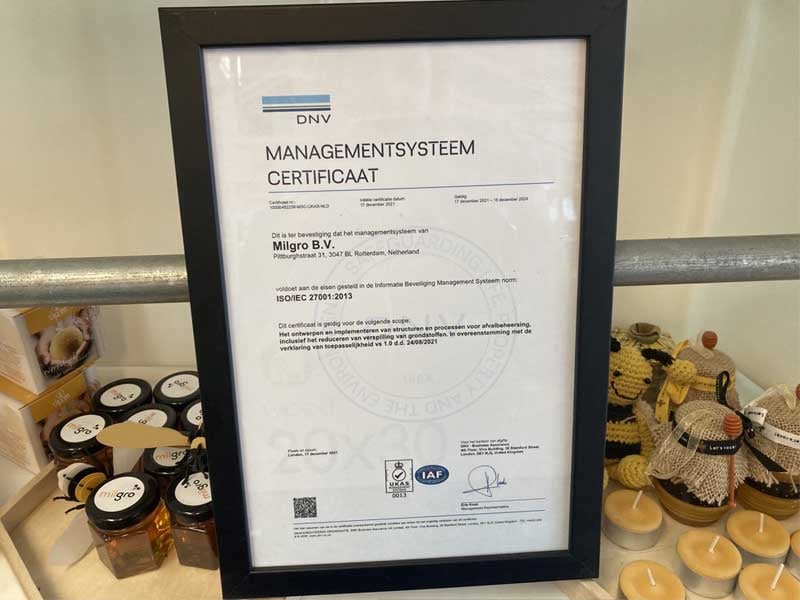The Dutch TV program 'de Vuilnisman', in which journalist Teun van de Keuken examined the waste sector, gave the viewer a new perspective on the challenging world of waste. Because although waste is woven into our daily lives, the world behind it remained unknown territory for many people. The increased interest, which is also apparent from recent news reports on waste sorting and waste dumping, underlines the importance of clarity about regulations. It is also a signal that the need to carefully manage the waste process from a sustainable perspective is increasing. The fact that laws and regulations are being enforced more and more is in line with this. Because how do you, as an organization, prevent the risk of damage to people or the environment? And how do you reduce the risk of reputational damage? Even when waste management is outsourced? In this blog we take a closer look at how certification and auditing play a major role in preventing this.
The basics: legislation in waste management
First we go back to the basics for legislation in waste management. This lies in the European Waste Framework Directive, which is practically translated into the National Waste Management Plan (LAP3). This describes when something is waste and which guidelines all parties involved in the waste process must adhere to. In other words, which permits and certifications belong to waste management.
Sector- or taskspecific certification or permit
Compliant with waste translates to certifications such as WEEELABEX, ISO14001 and VCA. A task-specific permit, such as the VIHB registration, which is issued by the NIWO to transporters, collectors, traders and intermediaries of waste, may also be mandatory. Auditing bodies ensure correct compliance with the permit or certificate, focused on sector-specific waste flows and quantities.
Enforcement and audits
Certification ensures assurance and enforcement of legislation and regulations. In many organizations all requirements are within QSHE; quality, safety, health and environment periodic audits, each with its own assessment. With the help of audits, companies not only measure to what extent the business processes comply with the legislation. It also reveals how the organization meets the requirements set by itself or by partners on the QSHE themes and sustainability ambitions.
Connecting with mission and policy
In the Netherlands, and actually throughout the EU, we are dealing with tightening regulations for the collection, transport and processing of waste. In addition, many companies have their own policy when it comes to sustainability (the E within QSHE). Milgro also sets high standards for setting up a compliant and sustainable waste process for and in consultation with its clients, which we call disposers, based on its mission. In this way, together with our partners, we keep the higher goal of minimizing the negative consequences for humans, animals and the environment, permanently in our sights.
“Transparency about the waste chain of disposers is key”, says Vera van Elteren, CQSE manager at Milgro. “For example, I was recently asked by a disposer connected to Milgro to audit an important processing process, namely oil and fat. By performing the audit jointly, the disposer was given the opportunity to follow the entire process. From receipt to processing and from transport to checks. The result, in addition to compliance, is a disposer who has gained insight and is satisfied with the level of unburdening provided”
Limiting risk, consequences and damage
Where there is chopping, chips fall. The one hundred percent prevention of (near) incidents requires continuous attention, regardless of how extensive the certification. However, because certified systems are designed to prevent incidents, continuous improvement and process innovation, the risk of recurrence or damage is reduced. And reputation damage is often avoided. Also think of processes that are not mandatory, but that prove to be important in practice. For example, Milgro distinguishes itself in the market because of our non-mandatory, but obtained ISO27001 certification (information security), which fits in well with the high standard we maintain for the processing of data.

The Higher Goal
Although Milgro attaches great importance to maintaining and further expanding its certification, we see certification as a tool and not an end in itself. As mentioned earlier, this means delivering continuous quality to processes that we direct and thereby limiting the negative consequences for humans, animals or the environment as much as possible. That is why we continuously monitor these processes in joint effort with our partners, whom we call recipients. In order to subsequently adjust, improve and innovate things to the optimum, if necessary, according to the Deming circle and the quality and environmental management systems. In this way, the disposers, whose waste and raw material flows we manage, can have confidence in our role as (chain) director to shape the joint transition to circular raw material management.
Want to know more or be completely unburdened?
Would you like to know more about Milgro's transparent audit program? Or be completely unburdened in your sustainable waste management? We are happy to tell you more about it in a conversation without obligation.
Stay informed
We regularly publish articles and blogs about environmental performance, sustainability and waste and resource management. To stay informed? Or follow us on LinkedIn










